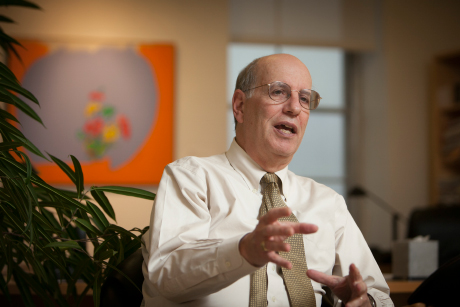A conversation with Harry Katz, Cornell's interim provost
By Joe Wilensky
Harry C. Katz, the Kenneth F. Kahn Dean of the School of Industrial and Labor Relations from 2005-14, was appointed Cornell’s interim provost effective Nov. 14. He spoke with the Chronicle Nov. 17 about his new position.
What experiences from your decade as ILR School dean will be most helpful to you as interim provost?

ILR has a very large undergraduate program, and I’ve spent a lot of time working with my faculty and student-services professionals to maintain and strengthen it. I think a key role for the provost is working with the faculty and staff to make sure we have as strong an undergraduate program as we can get.
I’m going to use some of what I’ve learned expanding international opportunities at ILR to encourage that expansion universitywide. Also at ILR, we increased service learning … and we’re going to use that experience, and similar experiences in the College of Human Ecology and other colleges, to make good use of the recent Einhorn Family Charitable Trust “Engaged Cornell” gift.
I continued to teach while I was dean, and I maintain a connection, a meaningful one to me, with the undergraduates. … I’m going to use some of what I learned from our students in serving as provost.
I am going to continue, this spring semester, co-teaching a professional master’s degree course based in ILR’s New York City office.
You will be working as interim provost through a presidential transition with several other new and interim deans.
As someone who has been at Cornell for 29 years, I see part of my role as helping bring stability and continuity in the central administration.
I’ve been in New York City a lot, as a dean and faculty member; also, as a statutory [college] dean, I’ve worked with the state legislature in Albany and have worked with Cornell vice presidents involved in our connections there.
I know a lot about this university, but I don’t understand all of it – in particular, I am interested in learning more about the sciences; so I’m going to go visit the College of Engineering, the College of Veterinary Medicine, and the College of Agriculture and Life Sciences within the next couple of weeks.
What has been your experience working with Cornell’s new budget model?
The switch to a sensible new budget model was a good idea, implemented under former Provost Kent Fuchs’ guidance. In particular, it more fully and accurately takes account of what we used to call “accessory instruction” – when one college teaches students from another college. We had a hodgepodge of a system that didn’t really effectively transfer resources to colleges when they were doing that sort of teaching. We now have a way of taking account of that in the new budget model. The new model also adds a lot more transparency, a better understanding of where the revenues are, where the expenses are.
It has been two to three years of good, thoughtful planning. We’re still making adjustments along the way … as we experience the model and learn from it.
The deans, the vice provosts and the provost are a really collegial group that has worked through, in an honest and open way, the changes required in this new model. With that kind of cooperative spirit, I think we’ll face up to any challenges. … The loyalty I feel toward this group is one of the reasons I took on this role.
What did you learn from serving on the 2009 search committee that led to Kent Fuchs’ appointment as provost?
It’s great that Cornell has an open, transparent process for filling these positions. It adds to the university that we’re always open to both internal and external candidates.
The process of searching – for a provost, president or dean – forces a university to think seriously about where it’s at, where it wants to go. … What’s the current state of the university, or the college? What needs to be improved, and what are our strengths? And then you ask incoming candidates what they think the strengths and weaknesses are. You actually learn a lot by that process. … We came up with a great new president, President-elect Elizabeth Garrett, through a very open, transparent search process. That’s to our credit.
Are you interested in the provost position beyond your interim appointment?
I potentially am. I want to see what it’s like to be at Day Hall; I want to see what the experience is, to work both with President David Skorton and incoming-President Garrett. ... And even if I choose to be a candidate, I don’t assume that I’ll be chosen. I have great respect for the process and for the judgment of the university’s leaders.
I look forward eventually to going back to faculty life at ILR and Cornell, and I don’t want to go to another university. … If I had to leave the faculty, I probably wouldn’t do this.
In just these past few days, so far I’ve been impressed by the quality of the staff in Day Hall. It has been a really easy transition, and it has gone more smoothly than I had imagined. I think it’s a testament to the stability of the university.
Media Contact
Get Cornell news delivered right to your inbox.
Subscribe